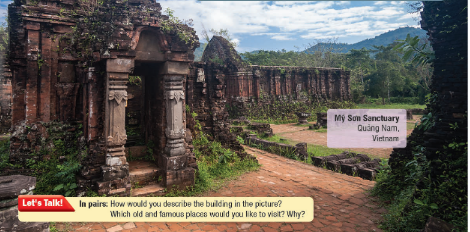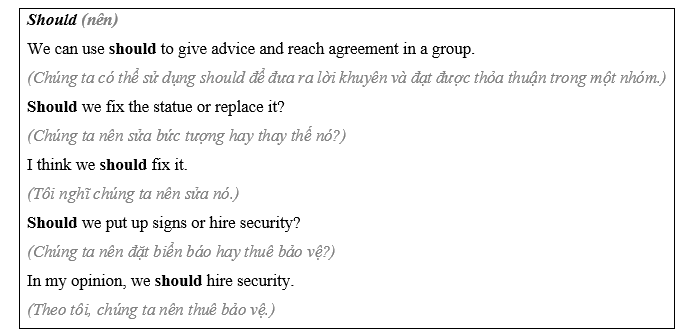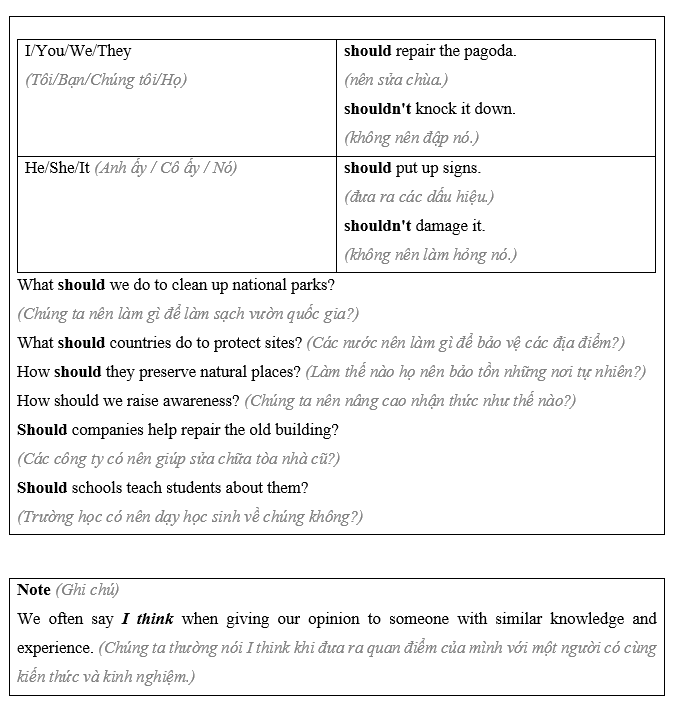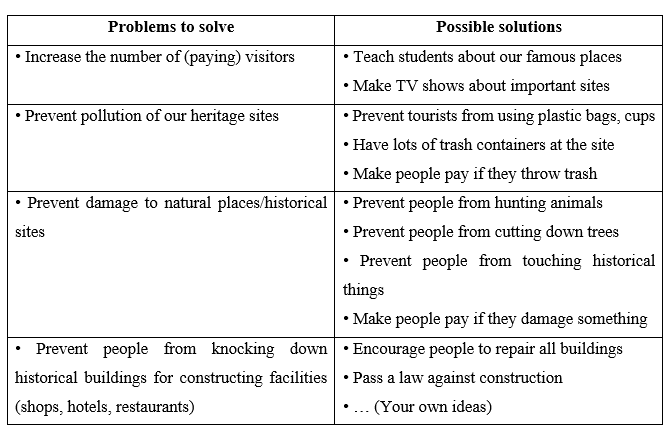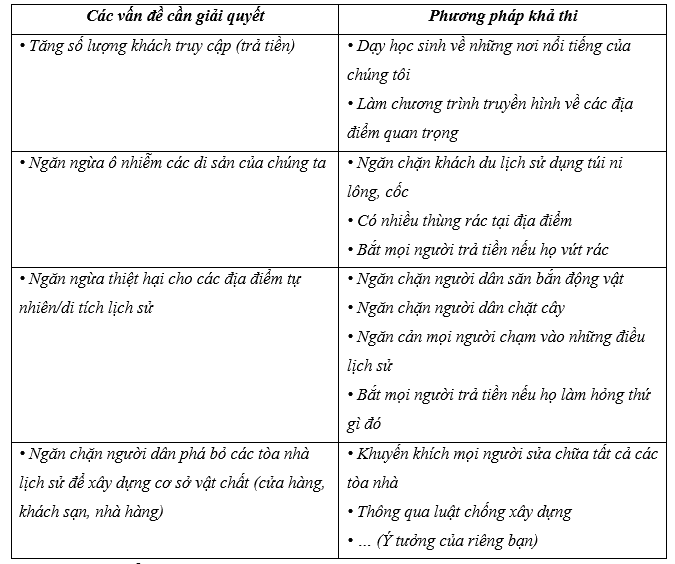Tiếng Anh 11 Unit 6 Lesson 2In pairs: How would you describe the building in the picture? Which old and famous places would you like to visit? Why? a. Read the sentences, then write the bold words in the conversation. b. In pairs: Do you know any historical buildings or heritages? What are they? a. Listen to city officials discussing a preservation project. Do they agree on the plan?
Lựa chọn câu để xem lời giải nhanh hơn
Let's Talk! In pairs: How would you describe the building in the picture? Which old and famous places would you like to visit? Why? (Làm theo cặp: Bạn sẽ mô tả các tòa nhà trong bức tranh như thế nào? Những nơi cũ và nổi tiếng bạn muốn đến thăm? Tại sao?)
Lời giải chi tiết: The building in the picture looks very old and is carved quite finely, bearing many typical historical architectural features. (Tòa nhà trong bức tranh trông đã rất cũ, và được chạm khắc khá tinh xảo, mang nhiều nét kiến trúc lịch sử tiêu biểu.) I want to visit the tomb of King Khai Dinh because the architecture of Khai Dinh Tomb brings something new, strange, unique, proud, out of place... created from architectural style. (Tôi muốn được đến tham quan lăng vua Khải Định bởi Về kiến trúc lăng Khải Định mang cái mới, cái lạ, cái độc đáo, cái ngông nghênh, lạc lõng... tạo ra từ phong cách kiến trúc.) New Words a a. Read the sentences, then write the bold words in the conversation. (Đọc các câu, sau đó viết các từ in đậm trong đoạn hội thoại.) We have preserved heritage sites so that people can enjoy them in the future. (Chúng tôi đã bảo tồn các di sản để mọi người có thể thưởng thức chúng trong tương lai.) The One Pillar Pagoda in Hanoi is a historical building. (Chùa Một Cột ở Hà Nội là một công trình lịch sử.) They built a mall after they knocked down the old building. (Họ đã xây dựng một trung tâm thương mại sau khi phá bỏ tòa nhà cũ.) We have to (Chúng tôi phải ngăn du khách bỏ rác trên bãi biển.) We should pass a law that stops people putting world heritage sites. (Chúng ta nên thông qua luật ngăn chặn mọi người đặt các di sản thế giới.) There’s a big golden statue of a lion in the center of my town. (Có một bức tượng sư tử lớn bằng vàng ở trung tâm thị trấn của tôi.) A: Let's discuss what we can do to (1) prevent our important cultural sites from disappearing. B: Well, firstly, we should do our best to (2) __________ the places that currently exist. A: I agree. There are many (3) __________ sites that are thousands of years old, so we cannot lose them now. B: Yes, we shouldn't (4) __________ any old buildings. They're all part of our country's history. A: And not only buildings - we should also look after other impressive cultural pieces, like (5) ____________s. B: I think we should (6) ____________ to stop people knocking down historical buildings. A: Good idea! Lời giải chi tiết:
A: Let's discuss what we can do to (1) prevent our important cultural sites from disappearing. B: Well, firstly, we should do our best to (2) preserve the places that currently exist. A: I agree. There are many (3) historical sites that are thousands of years old, so we cannot lose them now. B: Yes, we shouldn't (4) knock down any old buildings. They're all part of our country's history. A: And not only buildings - we should also look after other impressive cultural pieces, like (5) statues. B: I think we should (6) pass a law to stop people knocking down historical buildings. A: Good idea! Tạm dịch: A: Hãy thảo luận xem chúng ta có thể làm gì để (1) ngăn chặn các địa điểm văn hóa quan trọng của chúng ta biến mất. B: Chà, trước tiên, chúng ta nên cố gắng hết sức để (2) bảo tồn những nơi hiện đang tồn tại. Đáp: Tôi đồng ý. Có rất nhiều (3) di tích lịch sử hàng ngàn năm tuổi, vì vậy chúng ta không thể đánh mất chúng bây giờ. B: Vâng, chúng ta không nên (4) phá bỏ bất kỳ tòa nhà cũ nào. Tất cả đều là một phần của lịch sử đất nước chúng ta. A: Và không chỉ các tòa nhà - chúng ta cũng nên chăm sóc các tác phẩm văn hóa ấn tượng khác, như (5) bức tượng. B: Tôi nghĩ chúng ta nên (6) thông qua luật ngăn chặn mọi người phá bỏ các tòa nhà lịch sử. Đáp: Ý kiến hay đấy! New Words b b. In pairs: Do you know any historical buildings or heritages? What are they? (Theo cặp: Bạn có biết tòa nhà hoặc di sản lịch sử nào không? Chúng là gì?) Mỹ Sơn has many historical buildings. (Mỹ Sơn có nhiều tòa nhà lịch sử.) Lời giải chi tiết: There are numerous historical buildings in India, and one of the most striking ones is the Taj Mahal, which is located in Agra, Uttar Pradesh. It is a magnificent building and is considered a symbol of India's architectural heritage. (Có rất nhiều tòa nhà lịch sử ở Ấn Độ, và một trong những công trình nổi bật nhất là Taj Mahal, nằm ở Agra, Uttar Pradesh. Đó là một tòa nhà tráng lệ và được coi là biểu tượng di sản kiến trúc của Ấn Độ..) Listening a a. Listen to city officials discussing a preservation project. Do they agree on the plan? (Lắng nghe các quan chức thành phố thảo luận về một dự án bảo tồn. Họ có đồng ý về kế hoạch không?)
1. yes (có) 2. no (không) Phương pháp giải: Bài nghe: Quân: Hi, Jennifer. Is this a good time to talk about the project? Jennifer: Hi, Quân. Sure, let's talk in the conference room. Quân: So, we still have a few more weeks before we have to present our plan to the city. What do you think we should do? Jennifer: I think we should look at how much it will cost to preserve the old statues and buildings. What do you think? Quân: I agree. Jennifer: If it costs more than what we can make from tourism, I'm not sure we can preserve them all. Quân: You’re right, and there's a company offering the city a lot of money to knock them down so they can build luxury apartments. Jennifer: It would be terrible to lose all those historical buildings, the pagoda and the statues are over 200 years old. We should definitely prevent them from knocking that down. Quân: Yes, the Pagoda is the most popular tourist attraction in the area. Jennifer: What about the old departments? They don't make much money. Teenagers mostly just go there to take photos for their social media. Quân: I've been thinking about that. I think we should change the empty apartments into closed stores or even a museum. It was a popular idea in my city. And we can keep the original look of the outside of the building. What's your opinion? Jennifer: What a great idea. I believe that will work. Quân: Okay, I'll go back to my desk and type up the plan. Tạm dịch: Quân: Chào, Jennifer. Đây có phải là thời điểm tốt để nói về dự án? Jennifer: Chào Quân. Chắc chắn, chúng ta hãy nói chuyện trong phòng họp. Quân: Như vậy, chúng ta vẫn còn vài tuần nữa trước khi phải trình bày kế hoạch của mình với thành phố. Bạn nghĩ gì chúng ta nên làm gì? Jennifer: Tôi nghĩ chúng ta nên xem xét chi phí để bảo tồn những bức tượng và tòa nhà cũ là bao nhiêu. Bạn nghĩ sao? Quân: Tôi đồng ý. Jennifer: Nếu chi phí cao hơn những gì chúng ta có thể kiếm được từ du lịch, tôi không chắc chúng ta có thể bảo tồn tất cả. Quân: Bạn nói đúng, và có một công ty cung cấp cho thành phố rất nhiều tiền để đánh sập họ để họ xây dựng những căn hộ cao cấp. Jennifer: Sẽ thật khủng khiếp nếu mất đi tất cả những tòa nhà lịch sử, ngôi chùa và những bức tượng hơn 200 năm tuổi. Chúng ta chắc chắn nên ngăn chặn họ đánh sập nó. Quân: Vâng, Chùa là điểm thu hút khách du lịch nổi tiếng nhất trong khu vực. Jennifer: Thế còn các khoa cũ thì sao? Họ không kiếm được nhiều tiền. Thanh thiếu niên chủ yếu chỉ đến đó để chụp ảnh cho phương tiện truyền thông xã hội của họ. Quân: Tôi đã nghĩ về điều đó. Tôi nghĩ chúng ta nên biến những căn hộ trống thành những cửa hàng đóng cửa hoặc thậm chí là một viện bảo tàng. Đó là một ý tưởng phổ biến trong thành phố của tôi. Và chúng tôi có thể giữ nguyên hình dáng bên ngoài của tòa nhà. Ý kiến của bạn là gì? Jennifer: Thật là một ý tưởng tuyệt vời. Tôi tin rằng nó sẽ hiệu quả. Quân: Được, tôi về bàn viết kế hoạch. Lời giải chi tiết: 1. yes (có) Listening b b. Now, listen and fill in the blanks. (Bây giờ, hãy nghe và điền vào chỗ trống.)
1. Quân and Jennifer still have a few more weeks before they have to _________ their plan. 2. Jennifer thinks they should look at the ________ preserve the old statues and buildings. 3. A company wants to knock down the old buildings and build expensive _________. 4. Jennifer thinks they should ___________ the company from knocking down the buildings. 5. Quân wants to turn the unused apartments into a ___________or clothes stores. Lời giải chi tiết:
1. Quân and Jennifer still have a few more weeks before they have to present their plan. (Quân và Jennifer vẫn còn vài tuần nữa trước khi họ phải trình bày kế hoạch của mình.) 2. Jennifer thinks they should look at the cost preserve the old statues and buildings. (Jennifer nghĩ rằng họ nên xem xét chi phí bảo tồn những bức tượng và tòa nhà cũ.) 3. A company wants to knock down the old buildings and build expensive apartments. (Một công ty muốn phá bỏ những tòa nhà cũ và xây những căn hộ đắt tiền.) 4. Jennifer thinks they should prevent the company from knocking down the buildings. (Jennifer nghĩ rằng họ nên ngăn công ty phá bỏ các tòa nhà.) 5. Quân wants to turn the unused apartments into a museum or clothes stores. (Quân muốn biến những căn hộ không sử dụng thành bảo tàng hoặc cửa hàng quần áo.) Listening c
c. Read the Conversation Skill box. Then, listen and repeat. (Đọc hộp Kỹ năng đàm thoại. Sau đó, nghe và lặp lại.) Listening d d. Now, listen to the conversation again and number the phrases in the order you hear them. (Bây giờ, hãy nghe lại đoạn hội thoại và đánh số các cụm từ theo thứ tự bạn nghe được.) Lời giải chi tiết: 1. What do you think? (Bạn nghĩ sao?) 2. What's your opinion? (Ý kiến của bạn là gì?) Listening e e. In pairs: Do you think it's better to preserve old buildings or knock them down to build new ones? Why? (Theo cặp: Bạn nghĩ tốt hơn nên bảo tồn các tòa nhà cũ hay đập bỏ chúng để xây dựng những tòa nhà mới? Tại sao?) Lời giải chi tiết: I think if it is old buildings with historical value, they should be preserved to become places to visit, and for ordinary old buildings, they should be demolished to build new buildings to make houses for people. (Tôi nghĩ nếu là các tòa nhà cũ mang giá trị lịch sử đất nước thì nên bảo tồn để trở thành nơi tham quan, còn đối với các tòa nhà cũ thông thường thì nên phá để xây dựng những tòa nhà mới để làm nhà ở cho người dân.) Grammar Meaning and Use a
a. Look at the picture. What do you think the men are saying? (Nhìn vào bức tranh. Bạn nghĩ những người đàn ông đang nói gì?)
Phương pháp giải:
Lời giải chi tiết: Should we repair the old apartments or knock them down? (Nên sửa hay đập bỏ chung cư cũ?) I think we should repair them. (Tôi nghĩ chúng ta nên sửa chữa chúng.) Grammar Meaning and Use b b. Now, listen and check your ideas. (Bây giờ, hãy lắng nghe và kiểm tra ý kiến của bạn.) Should we repair the old apartments or knock them down? (Nên sửa hay đập bỏ chung cư cũ?) I think we should repair them. (Tôi nghĩ chúng ta nên sửa chữa chúng.) Grammar Meaning and Use c c. Listen and repeat. (Lắng nghe và lặp lại.)
Should we repair the old apartments or knock them down? (Nên sửa hay đập bỏ chung cư cũ?) I think we should repair them. (Tôi nghĩ chúng ta nên sửa chữa chúng.) Grammar Form and Practice a
a. Unscramble the sentences. (Sắp xếp lại câu.) 1. should/people/do/to/promote/tourism?/What What should people do to promote tourism? 2. the/national/ot/visitors/parks/limit/we/think/to/number/l/ should 3.to/teach/should/Universities/preserve/how/old/buildings. 4. should/prevent/heritage/How/from/sites/wa/people/damaging 5. containers/should/sites/have/trash/lots/Heritage/of Lời giải chi tiết: 1. What should people do to promote tourism? (Mọi người nên làm gì để quảng bá du lịch?) 2. I think we should limit the number of visitors to national parks. (Tôi nghĩ chúng ta nên giới hạn số lượng du khách đến các công viên quốc gia.) 3. Universities should teach how to preserve old buildings. (Các trường đại học nên dạy cách bảo tồn các tòa nhà cũ.) 4. How should we prevent people from damaging heritage sites? (Chúng ta nên làm thế nào để ngăn chặn người dân phá hoại các di sản?) 5. Heritage sites should have lots of trash containers. (Các khu di sản nên có nhiều thùng rác.) Grammar Form and Practice b b. Match the beginning and end of the sentences. Then, read the sentences to your partner. (Nối đầu và cuối câu. Sau đó, đọc các câu cho đối tác của bạn.) 1. Young people should 2. Citics shouldn't 3. Tourism companies should 4. Nationalparks shouldn't 5. The government should a. ... pass a law to stop building in natural heritage sites. b. ... learn about the historical places in their country. c. ... let companies knock down historical buildings . d. ... promote the historical sites in their country. e. ... allow visitors to food the wild animals in the park. Lời giải chi tiết:
1. Young people should learn about the historical places in their country. (Các bạn trẻ nên tìm hiểu về các di tích lịch sử của đất nước mình.) 2. Citics shouldn't let companies knock down historical buildings. (Công dân không nên để các công ty phá bỏ các tòa nhà lịch sử.) 3. Tourism companies should promote the historical sites in their country. (Các công ty du lịch nên quảng bá các di tích lịch sử ở đất nước của họ.) 4. Nationalparks shouldn't allow visitors to feed the wild animals in the park. (Các công viên quốc gia không nên cho phép du khách cho động vật hoang dã ăn trong công viên.) 5. The government should pass a law to stop building in natural heritage sites. (Chính phủ nên thông qua luật ngừng xây dựng tại các khu di sản thiên nhiên.) Grammar Form and Practice c c. In pairs: What are some natural or historical places in your area that are getting older, damaged, or dirty? Which ones do you think should be preserved? (Làm theo cặp: Đâu là một số địa điểm tự nhiên hoặc lịch sử trong khu vực của bạn đang trở nên cũ kỹ, hư hỏng hoặc bẩn thỉu? Những cái nào bạn nghĩ nên được bảo tồn?) The pagoda is damaged. I think we should preserve it. (Chùa bị hư hại. Tôi nghĩ chúng ta nên bảo tồn nó.) Should we preserve the old cafés? (Có nên bảo tồn những quán cà phê xưa?) Lời giải chi tiết: Because it was built during the war of resistance against the French, the museum was old and damaged. I think we should preserve it. (Do đã xây dựng từ chiến tranh kháng chiến chống Pháp nên bảo tàng đã bị cũ và hư hỏng. Tôi nghĩ chúng ta nên bảo tồn nó.) Pronunciation a
Pronunciation b b. Listen to the sentence and focus on how the intonation rises then falls. (Nghe câu nói và tập trung vào cách ngữ điệu lên xuống.) Should we put up signs or hire security? (Chúng ta nên đặt biển báo hay thuê bảo vệ?) Pronunciation c c. Listen and cross out the sentence with the wrong intonation. (Nghe và gạch bỏ câu có ngữ điệu sai.) Should we preserve the old buildings or knock them down? (Chúng ta nên bảo tồn các tòa nhà cũ hay đập bỏ chúng?) Should we prevent people from cutting down trees or put up signs saying "Don't leave trash"? (Chúng ta có nên ngăn chặn mọi người chặt cây hoặc đặt các biển báo "Không bỏ rác"?) Lời giải chi tiết: Should we prevent people from cutting down trees or put up signs saying "Don't leave trash"? (Chúng ta có nên ngăn chặn mọi người chặt cây hoặc đặt các biển báo "Không bỏ rác"?) - Wrong. Intonation falls then rises. (Sai. Ngữ điệu giảm rồi tăng.) Pronunciation d d. Read the sentences with the correct intonation to a partner. (Đọc các câu với ngữ điệu chính xác với đối tác.) Practice a a. Ask questions about the problems. Give your opinion (using the possible solutions or your own ideas), and then ask for your partner's opinion. (Đặt câu hỏi về các vấn đề. Đưa ra ý kiến của bạn (sử dụng các giải pháp khả thi hoặc ý tưởng của riêng bạn), sau đó hỏi ý kiến của đối tác của bạn.) How should we increase the number of paying visitors? (Làm thế nào chúng ta nên tăng số lượng khách truy cập trả tiền?) I think we should teach students. What do you think? (Tôi nghĩ chúng ta nên dạy cho học sinh. Bạn nghĩ sao?) Should we teach students about our famous places or make TV shows about important sites? (Chúng ta có nên dạy học sinh về những địa điểm nổi tiếng hay làm chương trình truyền hình về những địa điểm quan trọng không?)
Lời giải chi tiết: How should we prevent pollution of our heritage sites? (Làm thế nào chúng ta nên ngăn ngừa ô nhiễm các di sản của chúng ta?) Should we prevent tourists from using plastic bags, cups or make people pay if they throw trash? (Có nên ngăn cản khách du lịch sử dụng túi ni lông, cốc hay bắt mọi người phải trả tiền nếu họ vứt rác?) I think we should make people pay if they throw trash. (Tôi nghĩ chúng ta nên bắt mọi người trả tiền nếu họ vứt rác.) Practice b b. Practice with your own ideas. (Thực hành với ý tưởng của riêng bạn.) Lời giải chi tiết: How should we prevent damage to natural historical sites? (Làm thế nào chúng ta nên ngăn chặn thiệt hại cho di tích lịch sử tự nhiên?) I think we should renovate and rebuild. The regular check is the procedure the government or response companies most commonly use. (Tôi nghĩ chúng ta nên cải tạo và xây dựng lại. Kiểm tra thường xuyên là thủ tục mà chính phủ hoặc các công ty phản hồi thường sử dụng nhất.) Speaking a Speaking PRESERVING OUR HERITAGE (Bảo tồn di sản văn hóa của chúng ta) a. In pairs: Choose a world heritage site from below or another site you know. List the possible problems the site may have, eg, not being famous, pollution, damage, etc. Discuss the best ways of dealing with those problems to best preserve the site. (Theo cặp: Chọn một địa điểm di sản thế giới từ bên dưới hoặc một địa điểm khác mà bạn biết. Liệt kê các vấn đề có thể xảy ra mà địa điểm có thể gặp phải, ví dụ: không nổi tiếng, ô nhiễm, hư hỏng, v.v. Thảo luận về cách tốt nhất để giải quyết những vấn đề đó để bảo tồn địa điểm tốt nhất.)
Lời giải chi tiết: - The possible problems Hội An Ancient Town may have: + Pollution of the environment due to littering tourism and domestic waste. + Storms cause flooding. + The transformation and accretion of rivers and flows cause riverbank erosion, threatening the villages along the river routes and even the Old Quarter. (Các vấn đề Phố cổ Hội An có thể gặp phải: + Ô nhiễm môi trường do xả rác du lịch, rác thải sinh hoạt. + Bão gây lũ lụt. + Sự biến đổi, bồi tụ của các dòng sông gây sạt lở bờ sông, đe dọa các làng mạc ven sông và cả khu phố cổ.) - The best ways of dealing with those problems to best preserve the site: + Raise community awareness in dealing with the natural environment. + Make people pay if they throw trash. (Cách xử lý tốt nhất để bảo tồn di tích một cách tốt nhất: + Nâng cao ý thức cộng đồng trong việc ứng xử với môi trường tự nhiên. + Bắt mọi người trả tiền nếu họ vứt rác.) Speaking b b. Join another pair and tell them the site you chose. Share the problems you think it may have, and your solutions. (Tham gia một cặp khác và cho họ biết địa điểm bạn đã chọn. Chia sẻ những vấn đề bạn nghĩ nó có thể có và giải pháp của bạn.)
>> 2K9 Học trực tuyến - Định hướng luyện thi TN THPT, ĐGNL, ĐGTD ngay từ lớp 11 (Xem ngay) cùng thầy cô giáo giỏi trên Tuyensinh247.com. Bứt phá điểm 9,10 chỉ sau 3 tháng, tiếp cận sớm các kì thi.
|













